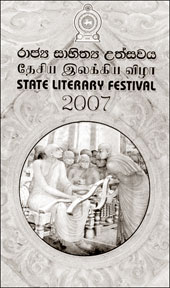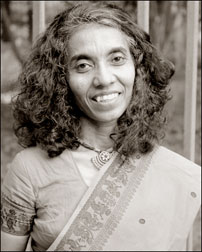
Awards, awards and more awards
State Literary Awards 2007 - English Laguage:
by Aditha Dissanayake
 Ever wondered what it is like to win the State Literary Award, apart
from receiving that heavy bronze sculpture of a swan which keeps getting
plainer and plainer every year, the cheque on which the number of digits
has increased, and the comforting knowledge from now on your book will
be strategically placed on every bookshelf in every book store across
the country? Ever wondered what it is like to win the State Literary Award, apart
from receiving that heavy bronze sculpture of a swan which keeps getting
plainer and plainer every year, the cheque on which the number of digits
has increased, and the comforting knowledge from now on your book will
be strategically placed on every bookshelf in every book store across
the country?
Wonder no more. Here is what the winners of this year's Literary
Awards had to say about this attempt by the state to measure the
immeasurable by placing art against art.
In ancient times, they used to kill the messengers who brought bad
news. I wonder what happened to those who brought good news? Were they
given presents equal to the weight of an elephant or simply dismissed
with a pat on their back?
Asgar Hussein, reminding me that times have changed, did neither when
I congratulated him two weeks ago and asked him if I could have a cover
of his book to be published in Writer's Den the coming Sunday.
"What on earth for?" he wondered.I told him, feeling I must surely be
stating the obvious; "Because you won the State Literary Award for
poetry this year, "Say that again?' he said, surprised. I repeated my
sentence and was promptly rewarded with a heartfelt "Thank you". "You
are the first to convey this great news to me" said Asgar.
When I track him down, two days after the Awards ceremony his
exultation had still not waned. "I am absolutely delighted" he begins
and explains that he had started to write poetry for the first time in
his life about two years ago and that "The Termite Castle" is his first
published work.
Continuing to talk about his own poetry and Sri Lankan poetry in
general he says he had received accolades from critics for Termite
Castle because his poems were not experimental. He believes abstract
poetry is a threat to all poetry because abstract poems might turn
people away from poetry altogether.
"English poetry in Sri Lanka needs a new vigour. One problem with our
poetry is that we must move away from domestic matters and beautiful
scenery and be more broad in our perspective. A line in a poem should
explain a thesis but a thesis should not be needed to explain that
line".
Another author who won the State Literary Award this year for her
maiden work is Ransiri Manike Silva. "Well... I am happy I won the
award" she says and gives credit to her classmate Dr. Lakshmi de Silva
for "pushing (her) all the time" till she had finally published her
work.
She has no immediate plans of publishing more short stories because
she writes only when it pleases her, and only when she is in the mood.
Would she write a novel one day?
No, she emphasizes with determination. "I am not a 'novel person'.
Short stories are my forte".
*****
Ranisir Manika shared the award with Ishankya Kodithuwakku and her
collection - "The Banana Tree Crisis". Ishankya is out of the country
and could not be contacted to be interviewed.
Winner of the award for the best translation from Sinhala into
English, for her book, In the Midst of Chaos, Padma Edirisinghe says
even though she wishes to spend her time on her own creative writing,
she does not mind utilizing her proficiency in Sinhala and English to
translate what others have written because being an educationalist
whenever she writes, she likes to have a "pragmatic purpose in mind".
"The field of translations is not new to me. I enjoy utilizing my
talents to introduce the Sinhala readers to English literature and vice
versa." She hopes to be "writing, writing and writing in the future
too".
*****
Winner of the award for Children's Literature, for "The Witch's
Daughter, Janaki Sooriyarachchi says she writes only for children
because there is a "small child in my heart and it is this child who
writes all my books".
Having already bagged two state Literary Awards simultaneously for
Children's Literature in Sinhala and English in 2004, this is her third
State award. Feeling very comfortable around children and loving them
with all her heart, Janaki makes one simple request.
"Please write about my website where my books are available for free
on-line reading, so that children here in Sri Lanka as well as those who
are living far away from home will be able to get a taste of their
motherland from my books". Janaki's website is easy to remember
www.tikiri.com.
Nihal de Silva received a posthumous award for 'Paduma Meets the
Sunbird' under the category of Juvenile Literature while Raja C.
Bandaranayake bagged the award for Non-Fiction for his book Betwixt
Isles which reconstructs the story of the Kandyan prisoners in
Mauritius.
*****
Modestly accepting that an award is not an indicator that you write
better or worse than any other author but an indication that a panel of
judges preferred your work over others Daya Dissanayake who won the
State Literary Award for the best English novel for his maiden work, Kat
Bitha in 1999 is happy that eight years later he won the same award for
his tenth book the Eavesdropper. Undoubtedly this has been a specially
good year for him.
His Chandraratnege Bawanthara Charikawa was short-listed for the
Godage award and for the Swarna Pusthaka Award as well, which was shared
between the five short listed authors.
This means Daya Dissanayake probably becomes the only author ever to
win two awards in the same year for novels written in two different
languages. Having written most of his ten books both in Sinhala and in
English he says he would like to see his work translated into Tamil so
that he could share them with every Sri Lankan.
****
Finally, reassuring as it is to receive such recognition for your
work, it is hard not to wonder for how long the sense of exultation will
last.
Would it last till November like it did for Mark Twain who believed
he could live on a compliment for two months, or will it end the day you
call the manager of a printing company to ask him if he could reprint
your book and have him say "The money you are willing to pay is not
enough.
The cost of printing has quadrupled". Having traversed the skies of
the literary arena as a star, what more effective way than this to be
brought back to earth?
[email protected]
Inspiration
For all librarians:
by Aditha Dissanayake
|

Premila Gamage
|
For someone who will soon be flying to Leeds, UK to pursue her Ph D
in Library and Information Science, Premila Gamage , the librarian of
the Institute of Policy Studies, when I met her a few days ago was one
lady in a mighty hurry; but one who still had the time for a brief chat
with me.
Having heard she was leaving the country, her colleagues had phoned
one another, "Premila is leaving on Tuesday night. We must do something
about it." Stop her from going? No. Of course not. "We must felicitate
her because she deserves it. This is the first time a Sri Lankan
Librarian is holding three positions at IFLA".
Tipped off by a veteran journalist about the event, surrounded by
neatly dressed bespectacled librarians, even though I was the only
non-librarian at the gathering, I managed to sit through the accolades
given to Premila, almost sharing her embarrassment with her. "People,
especially your colleagues, praise you to the skies only after you are
dead".
So thought I, till now, going by my experiences with some of my
colleagues in the media. Apparently things are different with those who
safeguard tombs of knowledge. Librarians go overboard when it comes to
appreciating a colleague.
According to M.S.U. Amarasiri, Director General of the National
Library and Documentation Board, Premila was the unofficially appointed
"Foreign Minister" of the Librarians of Sri Lanka not only because she
was constantly travelling abroad but also because she knew what was
happening, where the conferences were etc.
"She is someone with an outward look. She looks out into the world
and realizes that other people's lawns are greener" said a smiling M.S.U
Amarasuriya.
When she first started work with him Piyadasa Ranasinghe, the
President of the Sri Lanka Library Association, recalls how amazed he
was to see Premila's enthusiasm. He remembers her as a young girl who
was selected to work in the library. "Her duty was to type the catalogue
cards and arrange them in a box.
Within two weeks she learnt the whole art of catalogueing. Whenever
an error occurred she would show it to me and say "Sir, you have given
this number isn't this wrong?" He had encouraged her to get a degree and
says today he is proud to see the results of his powers of persuasion.
As her friend Pradeepa Wijethunge said Premila was a model student,
one who studied for the sake of knowledge and not simply for the sake of
passing exams.
Professor Russell Gordon, in his brief address said he was proud that
Sri Lanka had come into the spotlight through the achievements of
Premila. He foresaw a lot of work ahead of her once she returned to Sri
Lanka.
Going by her amazing powers of perseverance, Premila seen by her
colleagues as a person who thinks a lot, works a lot and talks a lot -
if necessary, will undoubtedly achieve a lot for Sri Lanka in the field
of library and information science, through her new posts at IFLA.
****
Premila Gamage, Librarian of the Institute of Policy Studies has been
elected to the governing board of The International Federation of
Library Associations and Institutions (IFLA), the apex body in the field
of Library and Information Science at the 73rd World Library and
Congress and General Council held in Durban, South Africa.
She is also the Chairperson of the Regional Standing Committee of
Asia and Oceania and the Division of Regional Activities which covers
Africa, Asia and Oceania, Latin America and the Caribbean. |
